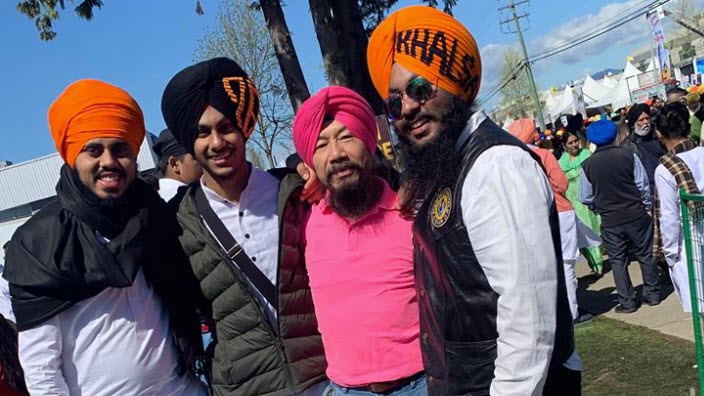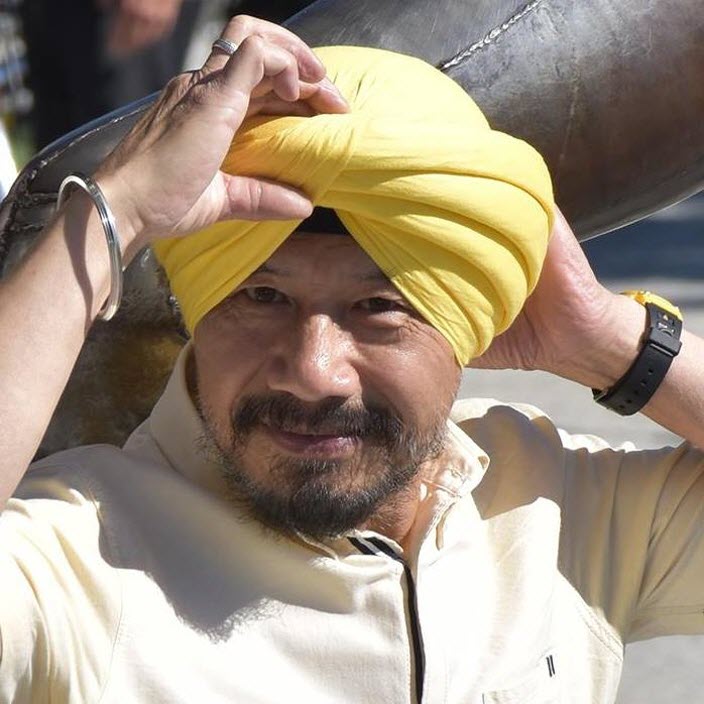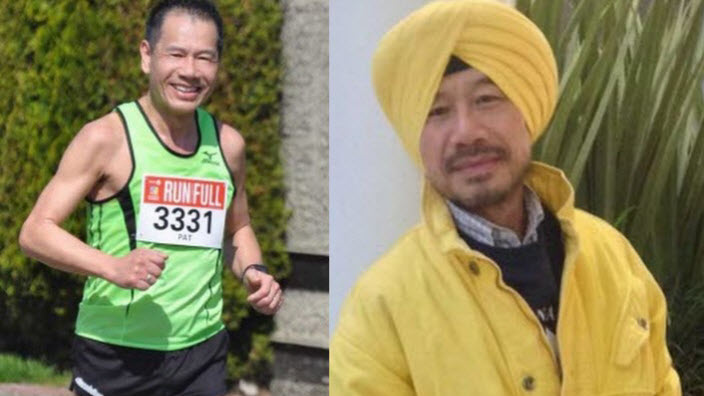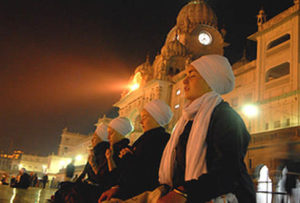Share your experience of becoming a Sikh

A collection of stories from people new to Sikhi, Sharing their experiences and challenges of being a Sikh.
Stephen – Connecticut
“Hello. I’m a white male, born and raised in the USA, baptized and confirmed Catholic, however I never really could accept what Catholicism/Christianity teaches. I always felt like I was reaching for something “out there” to understand know God. I’ve read about/researched other faiths, such as Islam, Hinduism, other sects of Christianity, and for a while I studied Buddhism. But again, these always left me wanting more. They spoke about God, “The Divine”, creator, etc, but they always spoke of different ways to identify with God, spoke about all these rituals to get closer to God, but those things feel inadequate to me. Reading the Guru Granth Sahib pulls something deep inside of me. At least, for me, it explains God in terms that I’m able to understand and connect with, and Sikhism, from what I’ve read, shares the same moral/ethical/world views that I do.”
Pat Singh Cheung – Vancouver
A former Buddhist of Chinese descent, Pat Singh Cheung, now loves to call the Vancouver Sikh community his ‘new family’ and faith in Sikhism his ‘anchor’ for life. Serving ‘chaa’ (tea) and ‘chawal’ (rice) and a crash course in Sikhi, Pat Singh Cheung has become quite a fixture in Vancouver’s Downtown Eastside neighbourhood in Canada.A former Buddhist of Chinese descent, the 68-year-old now loves to call the Vancouver Sikh community his “new family” and faith in Sikhism his “anchor” for life.
Mr Cheung told SBS Punjabi that his transformation has not been anything close to ordinary, but in fact, has been ‘life-altering’.
“Sikhism has changed the course of my life. I may not under the scriptures or the words in the hymns but I do feel connected to God,” said Mr Cheung.
Background:
Born to Buddhist parents in Hong Kong, Mr Cheung had migrated to Canada in the year 1973 to look after his family’s restaurant business in Fort St. James, 500 miles north of Vancouver. He later shifted to Vancouver, after his retirement at the age of 63.
Mr Cheung loves to run marathons and click pictures in his free time.
The beginning of Mr Cheung’s ‘life-changing’ journey:
Mr Cheung’s introduction to Sikhism happened five years ago when he spotted a large crowd of people standing in a queue in Downtown East, one of the oldest parts of Vancouver city.
When he approached the group, he saw a few people serving free meals.
“I went to inquire what was happening, a man, in turn, asked me if I was hungry,” said Mr Cheung.
“When I said no, he handed me over a pair of gloves and a handkerchief to cover my head and said, “Why don’t you help us serve then?”
“And just like that, I became a volunteer with Guru Nanak’s Free Kitchen.”
The experience prompted Mr Cheung to learn more about the Sikh faith and philosophy, oblivious to the fact that this would be the beginning of a “life-changing” phase.
He has since been volunteering with the Guru Nanak Free Kitchen every Sunday.
Embracing Sikhism:
In the past five years, Mr Cheung has learnt to swiftly tie a turban, has maintained unshorn hair and beard and sports a kara, one of the five articles of the faith.
“My ultimate goal is to become a baptised Sikh and learn Punjabi so I can get a better insight of the scriptures and can understand every word of the kirtan (reciting of religious hymns),” said Mr Cheung.
Having learnt to start his day early, Mr Cheung said his day isn’t complete without a visit to the local Sikh temple.
“I like to meditate, volunteer and often spend the better part of my day reading about Sikhism.”
“It all comes down to Sewa (selfless service), Simran (chanting) and Daana Paani (food and water) after all,” he added.
Mr Cheung said he often draws mixed reactions from people when they notice his ‘Sikh avatar’ and he, in turn, responds in a thick Cantonese accent peppered with some chaste Punjabi.
“They keep ogling at me and often are stop by to ask me questions. I think it’s wonderful as it gives me a chance to explain and spread awareness about Sikhism,” he added.
Challenges:
Mr Cheung’s journey has not been without its challenges.
He told SBS Punjabi that his family back in Hong Kong has not been very accepting of his choices.
“They often ask me, why have you abandoned your religion? It’s hard for them to understand.”
“But I know that their heart is in the right place and they will eventually come around,” said a hopeful Mr Cheung who has now devised a new strategy for the unordained.
He has written and published a pamphlet called “3 facts about Sikhi” in Cantonese to help people of Chinese- descent understand the meaning and significance of the Sikh way of life.
“I know and understand that the journey I have embarked upon requires huge dedication and commitment and I feel I’m made for it,” said Mr Cheung.
Jivanjot Kaur – USA
Whose birth name was Georgia Rangel, was born into a Christian family. At onetime, in her quest for a fully satisfying religion she had embraced Judaism, but many years later she came into contact with some Sikhs that gave her an opportunity to get acquainted with Sikhism. After she had studied and explored Sikhism she was convinced that her quest for a fully satisfying religion had come to a close. But she did not adopt Sikhism on the spur of the moment. Rather it was after spending 7-8 years that she decided to be baptised in 1994. A letter by her had appeared in the October issue of the Spokesman. A few days later she herself called our office. We present some excerpts from our talk with her.
Ms Jivanjot Kaur Khalsa talks to The Spokesman
Q: Ms. Jivanjot Kaur how were you aquainted with Sikhism?
A: I was born in a Christian family. I left home at the age of seventeen and visited various churches associated with every sect of Christianity. I saw that even in some of the liberal sects of Christianity there were some questions that they did not allow to be questioned. I was not satisfied. Then I came into contact with Judaism. I became a Jew at the age of twenty two and continued to remain the follower of this religion for thirty years. During the last twenty five years of these thirty years I also remained a member of one Jewish temple. The Sikhs started coming to the United States in large numbers only after 1965. That is why I was acquainted with Sikhism very late.
Q: How were you aquainted?
A: The Sikhs used to attract attention because of their distinct appearance. I also saw such Sikhs who reached the US in the Sikh form and would soon be bereft of their long hair. But then there were others who would maintain their identity. Three such Sikhs lived in my neighbourhood. The mother of one of these Sikhs became unconscious and went into a coma. That Sikh requested all of his friends to reach the Gurdwara and participate in the prayer service. All prayed together and the mother of that Sikh friend regained her consciousness and recovered. He had this firm belief that the collective prayer by all of us had been heard by the Almighty. Then he got the Kirtan performed at his residence. This is how I was introduced to Sikhism.
Q: Did you make some more efforts to know more about Sikhism?
A: Yes, I used to take interest in religion since my younger days, but there arose some questions in my mind which could neither be answered by the Christian nor by the Jewish religion and philosophy. However, when I started reading about Sikhism it seemed that Sikhism had answers to those questions. Sikhism is an all embracing religion in which there is no place for misconceptions, fallacies and rituals. Only one God is the Father of all human beings who are like a single family. I started deriving a sense of peace and equipoise from Gurbani.
Q: Did your relatives, friends etc. dissuade you from embracing Sikhism?
A: My daughter was annoyed the most of all. She would ask me how could I change my religion. I said, “I have not changed my religion. Even earlier I believed in things which were neither Christian nor of the Jewish religion and philosophy. When I went through the Sikh philosophy, I was greatly pleased to find my thoughts and feelings matching with it. This was exactly what I used to think about. The fact is that right from the begining I believed in the tenets of Sikhism without having been introduced to it. After embracing Sikhism I felt that I had ultimately reached my home.” At first my daughter would not understand me but after meeting many of my Sikh friends she was convinced that Sikhs were good people.
Q: Now you tie your hair and also wear a small turban. Are you a follower of Yogi Bhajan?
A: No, I’m a follower of the Guru alone. I do not believe in anybody except Guru and God. Yogi Bhajan has done a good thing that he has introduced Sikhism to the Americans but like many sants in Punjab he is also a sant with a separate following. Some of his followers have left him (and not Sikhism) while many remain with him. I never knew Yogi Bhajan. I worship the one God. In Christianity only Christ is worshipped and many Christians regard him as God. That is why Sikhism appeals to me very much. I do not give importance to sants. My tying of hair and wearing a turban has nothing to do with Yogi Bhajan.
Q: Do you live in the United States?
A: For six months I live in the US and for six months in Punjab. In a way Punjab has become a second home to me. I am suffering from a certain disease and my body cannot bear too much of cold. That is why I come to Patiala in winters. Here the climate is conducive to my health and I also get treatment for my ailments.
Q: How do you feel by remaining amongst the Punjabi Sikhs?
A: The Sikhs of Patiala are very good and love me a lot. Earlier I had also lived in Amritsar. I got an opportunity to live in the homes of some Sikhs. I noticed that despite being Sikhs, they believed in Hindu customs, rituals and beliefs. While living with one such family I was asked not to wash my hair on Tuesdays, Thursdays and Saturdays because by doing so their only son was likely to meet with some calamity. This superstition went against the tenets of Sikhism. Now that I live in Patiala, I am free to wash my hair on any day of the week. I also know a Sikh in the United States who has done the ‘prakash’ of Guru Granth Sahib at his home and has also made an alcohol bar there. I have noticed that many Sikhs do not have adequate knowledge of Sikhism. They are more under the influence of brahminical customs and fallacies. There is a need to tell them about the principles of Sikhism.






